Abstract
Although all commercial forms of asbestos have been demonstrated to be carcinogenic in animals, so far epidemiological data are controversial concerning what asbestos types are the most carcinogenic and fibrogenic in humans. In order to understand the early cellular events induced by fibrous particles, different in vitro studies (hemolysis, release of enzymes by macrophages, assays on cell culture systems) have been carried out in several laboratories; most of these studies have shown that cell and subcellular in vitro responses were different depending on fiber types: chrysotile versus amphiboles. This presentation compares the results of different laboratories with our data obtained by using a model which modifies the chemistry of the fibers by acid treatment. The acid-leached chrysotile and acid-treated amphibole fibers showed different biological responses in several in vitro systems used in comparison to unleached fibers. These differences in the in vitro reactivity were related to the chemical state of the fibers and might explain the differences in their effects in animals after intrapleural injection as assessed by the percentage of mesothelioma, the latency period, the survival time and the degree of pleural fibrosis. The carcinogenic effect of the fibers is discussed in relation of their in vitro inflammatory or cytotoxic responses.
Full text
PDF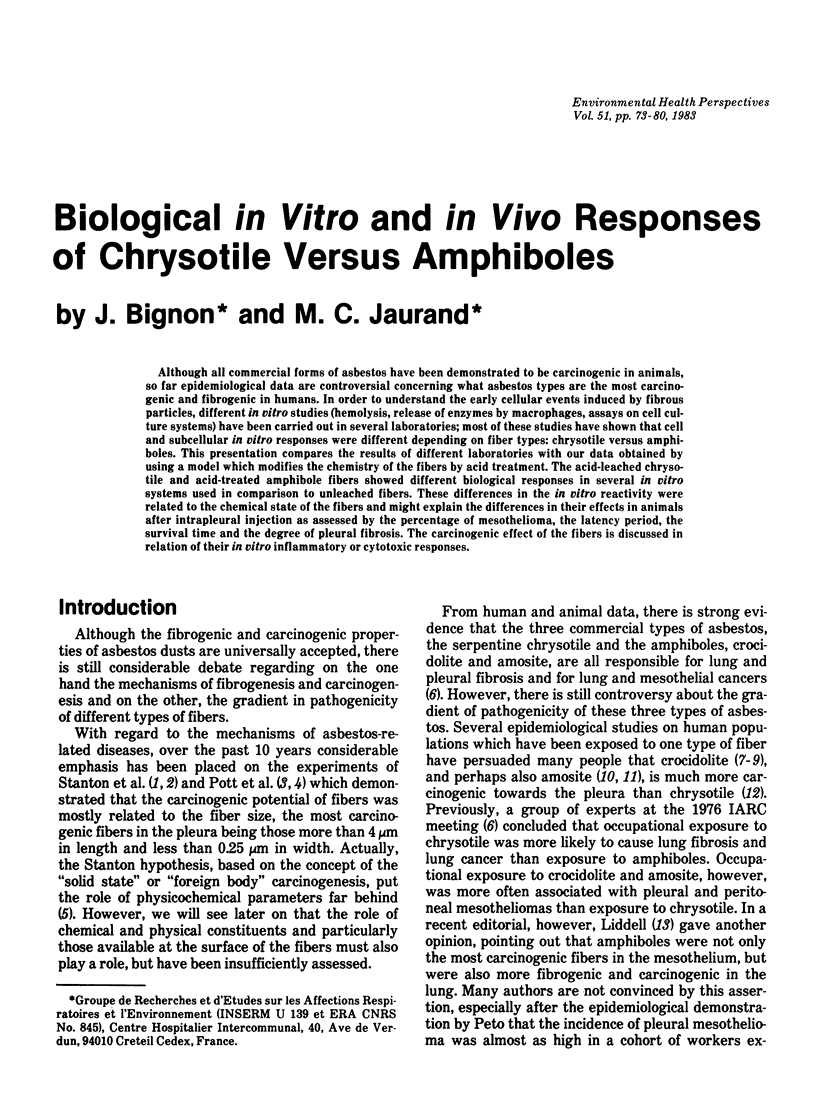
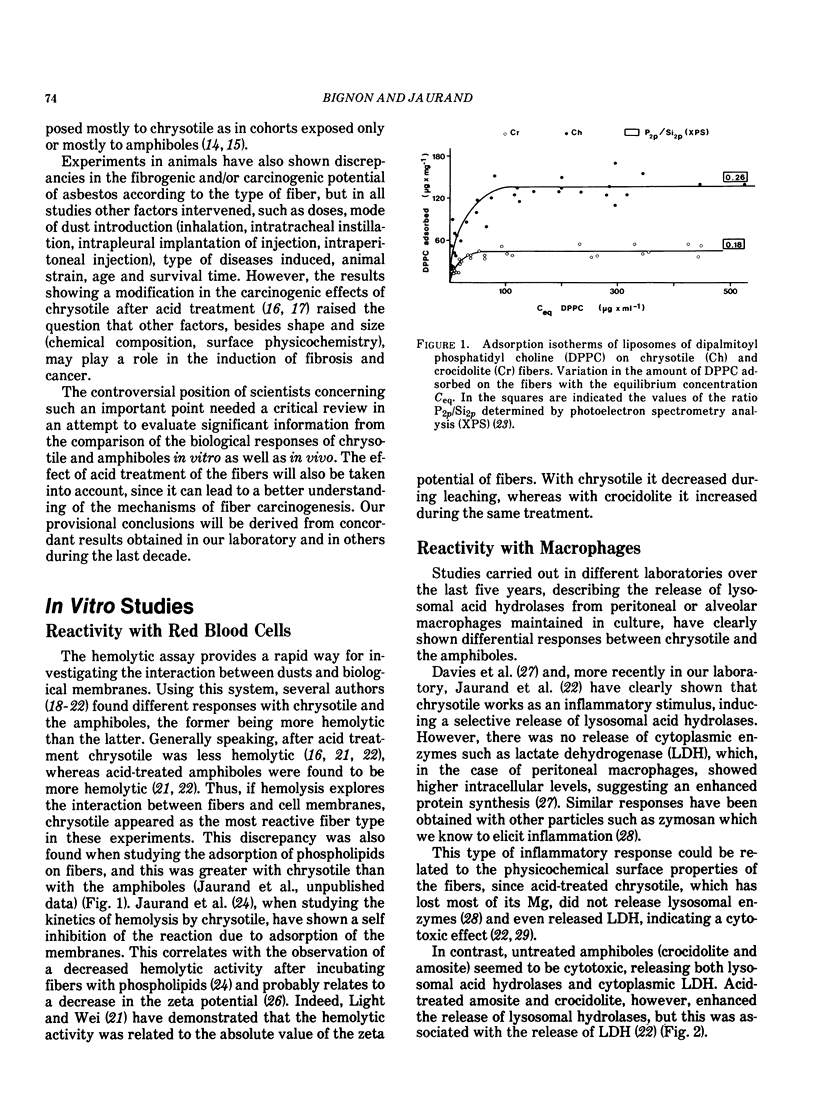
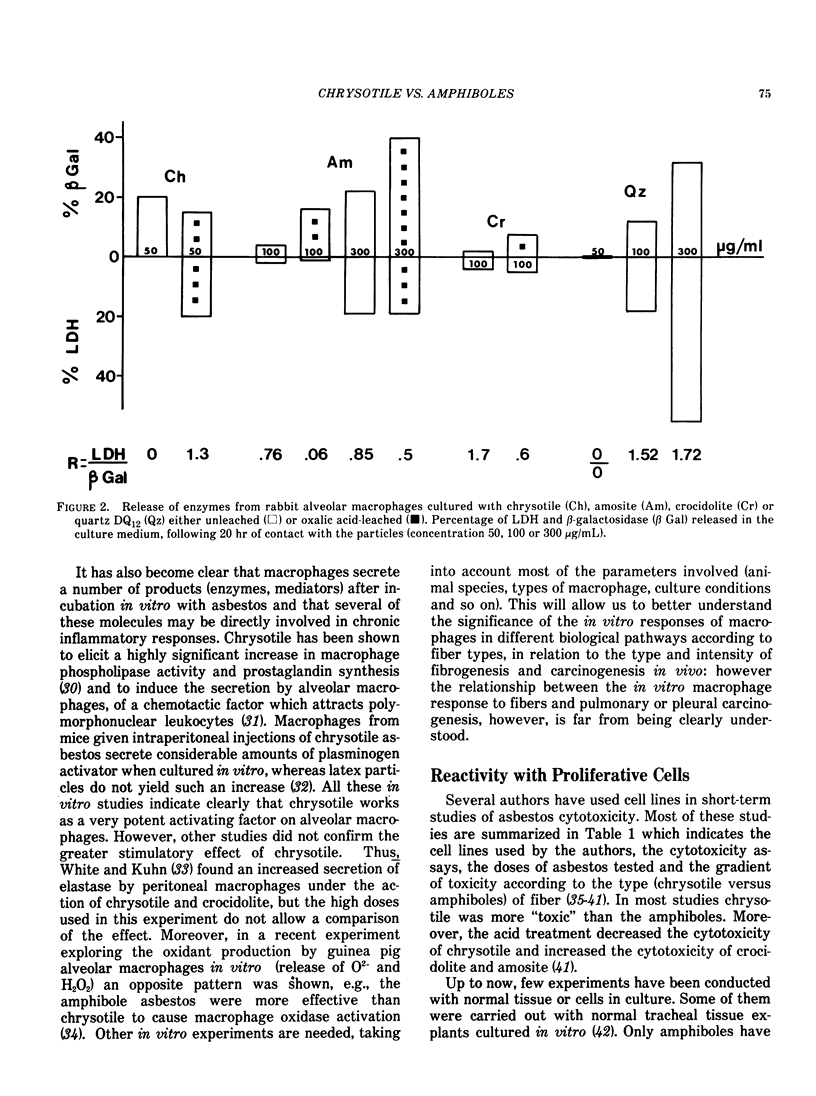
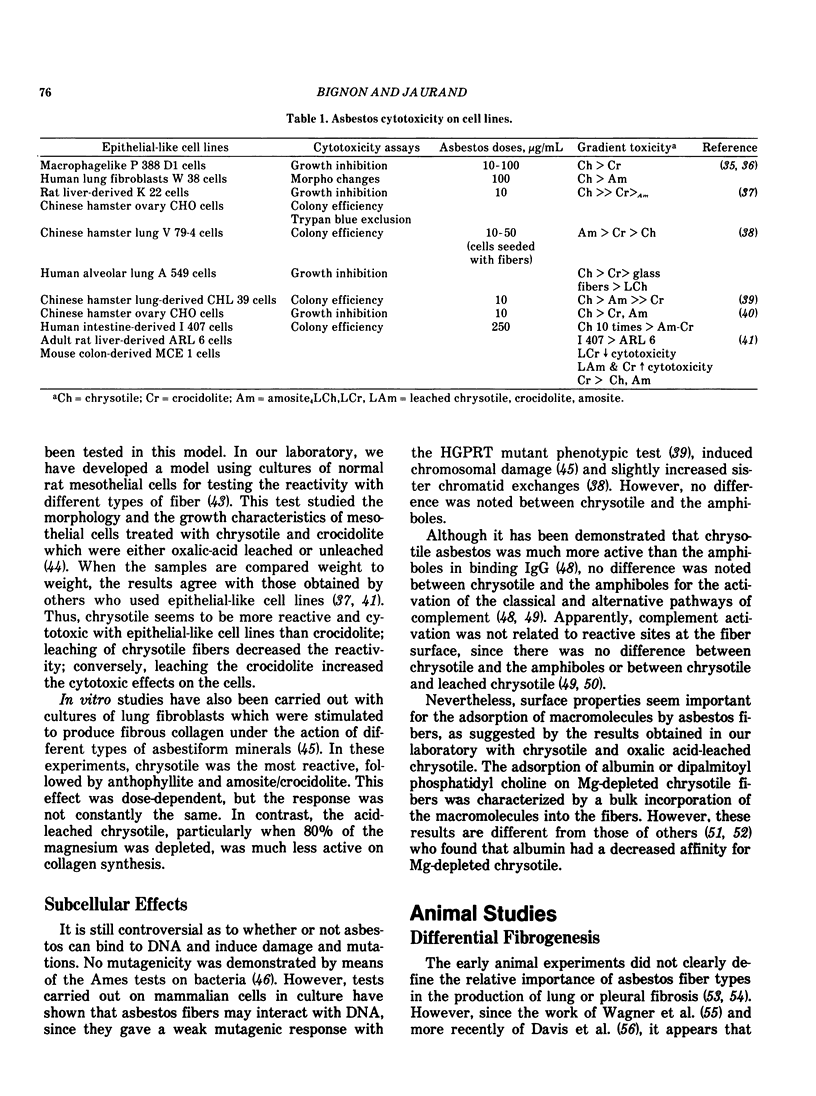
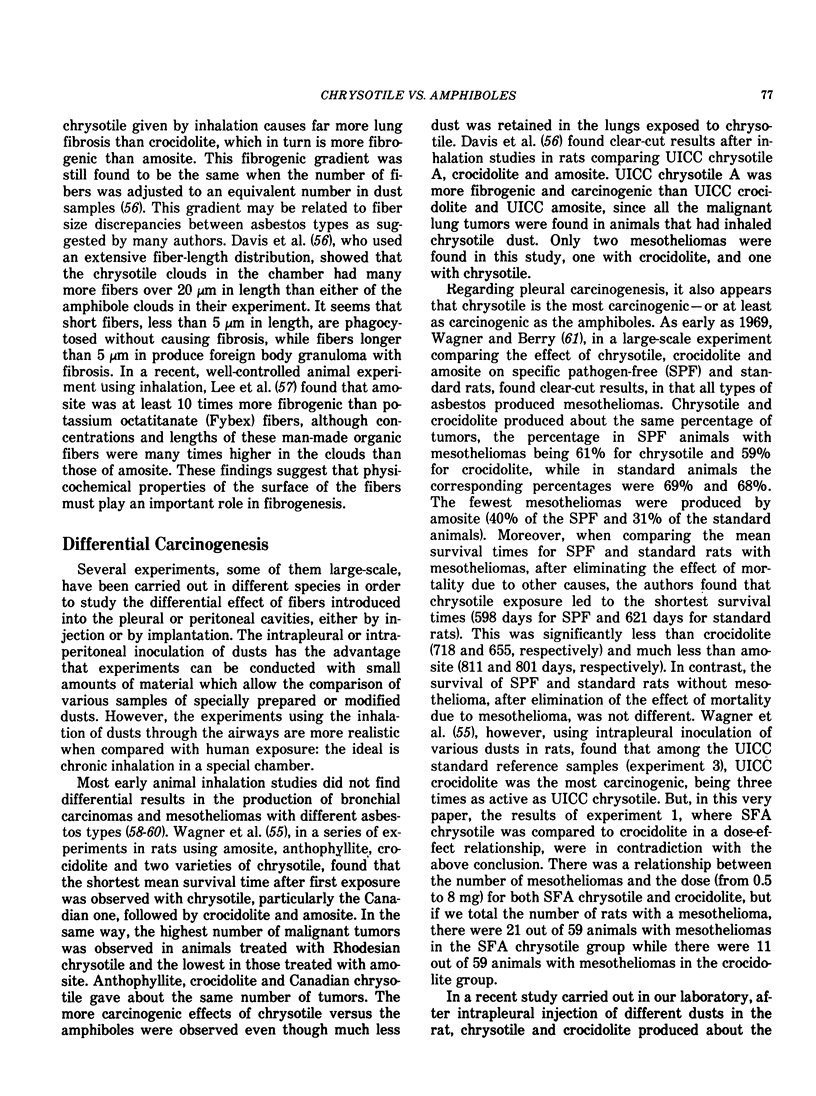
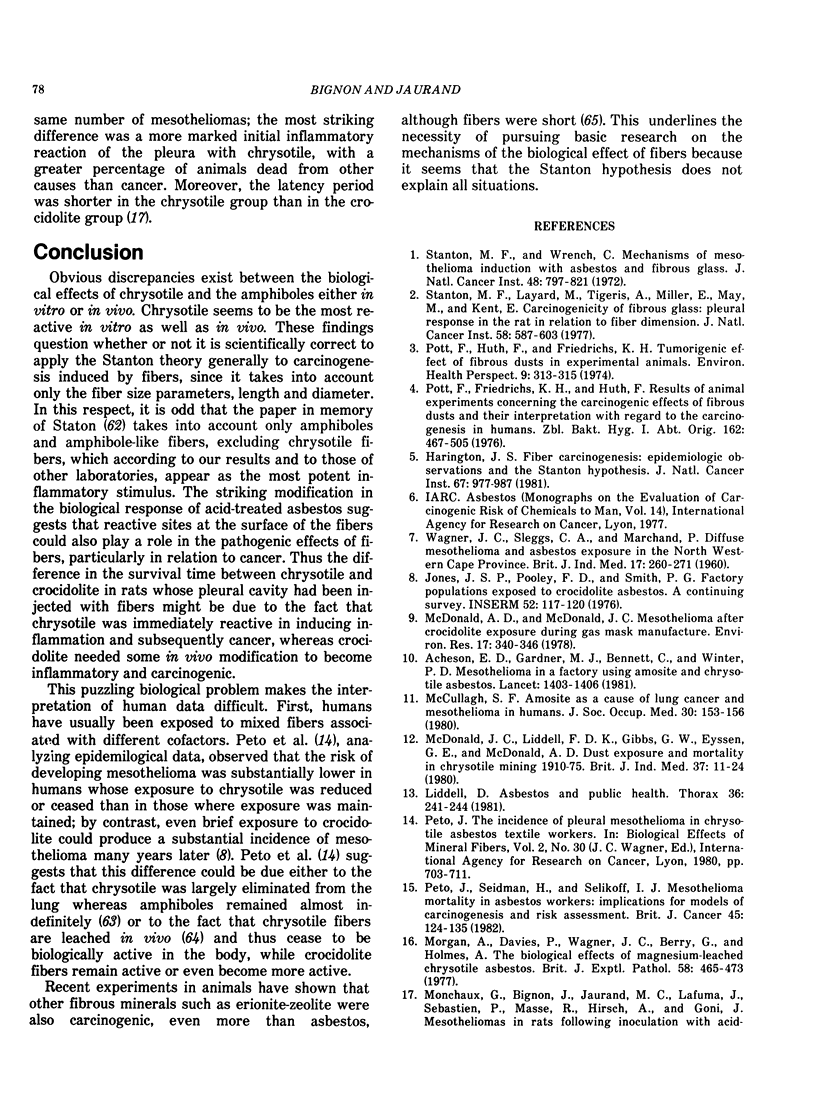
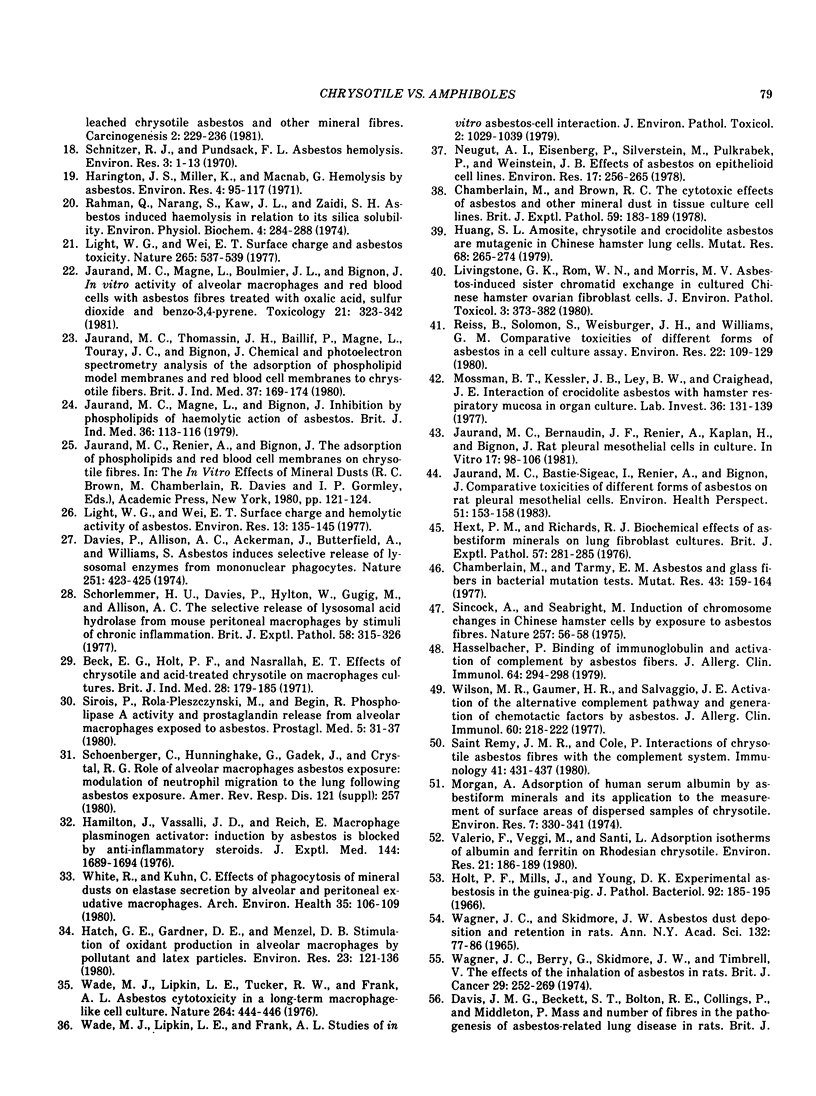
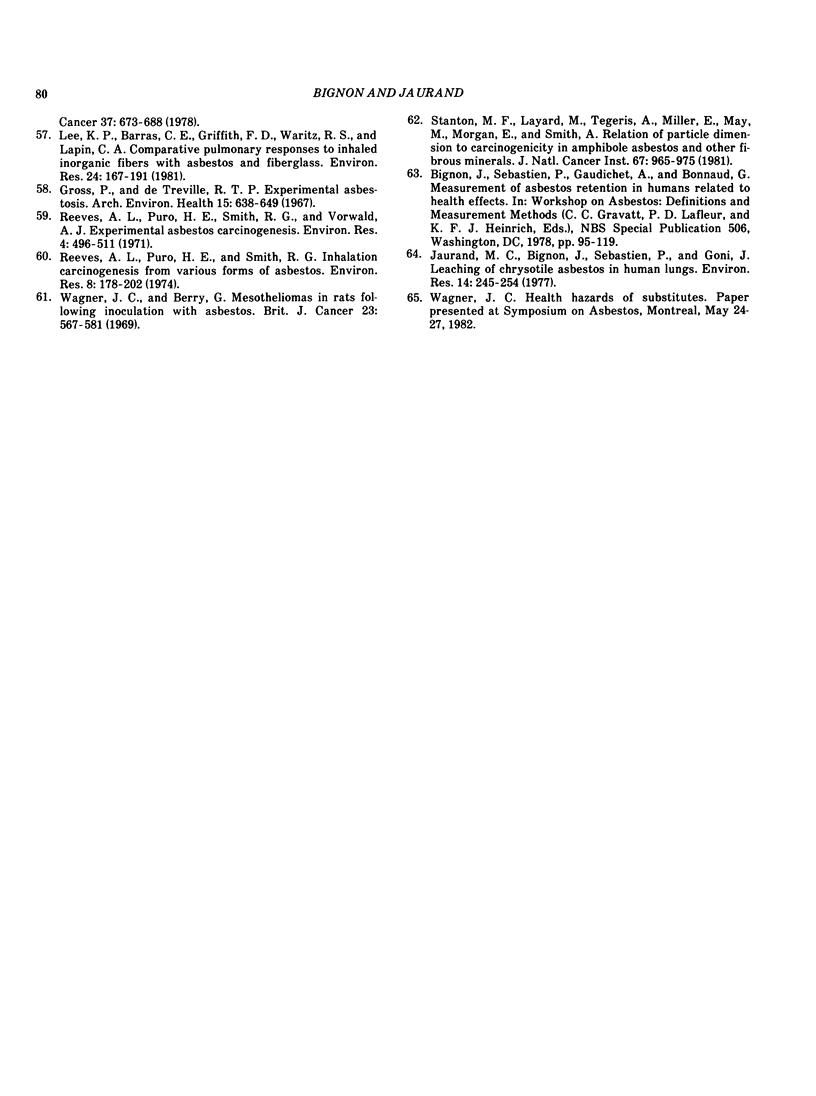
Selected References
These references are in PubMed. This may not be the complete list of references from this article.
- Beck E. G., Holt P. F., Nasrallah E. T. Effects of chrysotile and acid-treated chrysotile on macrophage cultures. Br J Ind Med. 1971 Apr;28(2):179–185. doi: 10.1136/oem.28.2.179. [DOI] [PMC free article] [PubMed] [Google Scholar]
- Chamberlain M., Brown R. C. The cytotoxic effects of asbestos and other mineral dust in tissue culture cell lines. Br J Exp Pathol. 1978 Apr;59(2):183–189. [PMC free article] [PubMed] [Google Scholar]
- Chamberlain M., Tarmy E. M. Asbestos and glass fibres in bacterial mutation tests. Mutat Res. 1977 May;43(2):159–164. doi: 10.1016/0027-5107(77)90001-x. [DOI] [PubMed] [Google Scholar]
- Davies P., Allison A. C., Ackerman J., Butterfield A., Williams S. Asbestos induces selective release of lysosomal enzymes from mononuclear phagocytes. Nature. 1974 Oct 4;251(5474):423–425. doi: 10.1038/251423a0. [DOI] [PubMed] [Google Scholar]
- Gross P., De Treville R. T. Experimental asbestosis. Studies on the progressiveness of the pulmonary fibrosis caused by chrysotile dust. Arch Environ Health. 1967 Nov;15(5):638–649. doi: 10.1080/00039896.1967.10664980. [DOI] [PubMed] [Google Scholar]
- Hamilton J., Vassalli J. D., Reich E. Macrophage plasminogen activator: induction by asbestos is blocked by anti-inflammatory steroids. J Exp Med. 1976 Dec 1;144(6):1689–1694. doi: 10.1084/jem.144.6.1689. [DOI] [PMC free article] [PubMed] [Google Scholar]
- Harington J. S. Fiber carcinogenesis: epidemiologic observations and the Stanton hypothesis. J Natl Cancer Inst. 1981 Nov;67(5):977–989. [PubMed] [Google Scholar]
- Harington J. S., Miller K., Macnab G. Hemolysis by asbestos. Environ Res. 1971 Apr;4(2):95–117. doi: 10.1016/0013-9351(71)90038-7. [DOI] [PubMed] [Google Scholar]
- Hasselbacher P. Binding of immunoglobulin and activation of complement by asbestos fibers. J Allergy Clin Immunol. 1979 Oct;64(4):294–298. doi: 10.1016/0091-6749(79)90147-7. [DOI] [PubMed] [Google Scholar]
- Hatch G. E., Gardner D. E., Menzel D. B. Stimulation of oxidant production in alveolar macrophages by pollutant and latex particles. Environ Res. 1980 Oct;23(1):121–136. doi: 10.1016/0013-9351(80)90099-7. [DOI] [PubMed] [Google Scholar]
- Hext P. M., Richards R. J. Biochemical effects of asbestiform minerals on lung fibroblast cultures. Br J Exp Pathol. 1976 Jun;57(3):281–285. [PMC free article] [PubMed] [Google Scholar]
- Holt P. F., Mills J., Young D. K. Experimental asbestosis in the guinea-pig. J Pathol Bacteriol. 1966 Jul;92(1):185–195. doi: 10.1002/path.1700920119. [DOI] [PubMed] [Google Scholar]
- Huang S. L. Amosite, chrysotile and crocidolite asbestos are mutagenic in Chinese hamster lung cells. Mutat Res. 1979 Nov;68(3):265–274. doi: 10.1016/0165-1218(79)90158-7. [DOI] [PubMed] [Google Scholar]
- Jaurand M. C., Bastie-Sigeac I., Renier A., Bignon J. Comparative toxicities of different forms of asbestos on rat pleural mesothelial cells. Environ Health Perspect. 1983 Sep;51:153–158. doi: 10.1289/ehp.8351153. [DOI] [PMC free article] [PubMed] [Google Scholar]
- Jaurand M. C., Bernaudin J. F., Renier A., Kaplan H., Bignon J. Rat pleural mesothelial cells in culture. In Vitro. 1981 Feb;17(2):98–106. doi: 10.1007/BF02618065. [DOI] [PubMed] [Google Scholar]
- Jaurand M. C., Bignon J., Sebastien P., Goni J. Leaching of chrysotile asbestos in human lungs. Correlation with in vitro studies using rabbit alveolar macrophages. Environ Res. 1977 Oct;14(2):245–254. doi: 10.1016/0013-9351(77)90036-6. [DOI] [PubMed] [Google Scholar]
- Jaurand M. C., Magne L., Bignon J. Inhibition by phospholipids of haemolytic action of asbestos. Br J Ind Med. 1979 May;36(2):113–116. doi: 10.1136/oem.36.2.113. [DOI] [PMC free article] [PubMed] [Google Scholar]
- Jaurand M. C., Magne L., Boulmier J. L., Bignon J. In vitro reactivity of alveolar macrophages and red blood cells with asbestos fibres treated with oxalic acid, sulfur dioxide and benzo-3,4-pyrene. Toxicology. 1981;21(4):323–342. doi: 10.1016/0300-483x(81)90147-5. [DOI] [PubMed] [Google Scholar]
- Jaurand M. C., Thomassin J. H., Baillif P., Magne L., Touray J. C., Bignon J. Chemical and photoelectron spectrometry analysis of the adsorption of phospholipid model membranes and red blood cell membranes on to chrysotile fibres. Br J Ind Med. 1980 May;37(2):169–174. doi: 10.1136/oem.37.2.169. [DOI] [PMC free article] [PubMed] [Google Scholar]
- Jones J. S., Pooley F. D., Smith P. G. Factory populations exposed to crocidolite asbestos - a continuing survey. IARC Sci Publ. 1976;(13):117–120. [PubMed] [Google Scholar]
- Lee K. P., Barras C. E., Griffith F. D., Waritz R. S., Lapin C. A. Comparative pulmonary responses to inhaled inorganic fibers with asbestos and fiberglass. Environ Res. 1981 Feb;24(1):167–191. doi: 10.1016/0013-9351(81)90143-2. [DOI] [PubMed] [Google Scholar]
- Liddell D. Asbestos and public health. Thorax. 1981 Apr;36(4):241–244. doi: 10.1136/thx.36.4.241. [DOI] [PMC free article] [PubMed] [Google Scholar]
- Light W. G., Wei E. T. Surface charge and asbestos toxicity. Nature. 1977 Feb 10;265(5594):537–539. doi: 10.1038/265537a0. [DOI] [PubMed] [Google Scholar]
- Light W. G., Wei E. T. Surface charge and hemolytic activity of asbestos. Environ Res. 1977 Feb;13(1):135–145. doi: 10.1016/0013-9351(77)90012-3. [DOI] [PubMed] [Google Scholar]
- McCullagh S. F. Amosite as a cause of lung cancer and mesothelioma in humans. J Soc Occup Med. 1980 Oct;30(4):153–156. doi: 10.1093/occmed/30.4.153. [DOI] [PubMed] [Google Scholar]
- McDonald A. D., McDonald J. C. Mesothelioma after crocidolite exposure during gas mask manufacture. Environ Res. 1978 Dec;17(3):340–346. doi: 10.1016/0013-9351(78)90038-5. [DOI] [PubMed] [Google Scholar]
- McDonald J. C., Liddell F. D., Gibbs G. W., Eyssen G. E., McDonald A. D. Dust exposure and mortality in chrysotile mining, 1910-75. Br J Ind Med. 1980 Feb;37(1):11–24. doi: 10.1136/oem.37.1.11. [DOI] [PMC free article] [PubMed] [Google Scholar]
- Morgan A., Davies P., Wagner J. C., Berry G., Holmes A. The biological effects of magnesium-leached chrysotile asbestos. Br J Exp Pathol. 1977 Oct;58(5):465–473. [PMC free article] [PubMed] [Google Scholar]
- Mossman B. T., Kessler J. B., Ley B. W., Craighead J. E. Interaction of crocidolite asbestos with hamster respiratory mucosa in organ culture. Lab Invest. 1977 Feb;36(2):131–139. [PubMed] [Google Scholar]
- Neugut A. I., Eisenberg D., Silverstein M., Pulkrabek P., Weinstein I. B. Effects of asbestos on epithelioid cell lines. Environ Res. 1978 Oct;17(2):256–265. doi: 10.1016/0013-9351(78)90028-2. [DOI] [PubMed] [Google Scholar]
- Peto J., Seidman H., Selikoff I. J. Mesothelioma mortality in asbestos workers: implications for models of carcinogenesis and risk assessment. Br J Cancer. 1982 Jan;45(1):124–135. doi: 10.1038/bjc.1982.15. [DOI] [PMC free article] [PubMed] [Google Scholar]
- Pott F., Huth F., Friedrichs K. H. Tumorigenic effect of fibrous dusts in experimental animals. Environ Health Perspect. 1974 Dec;9:313–315. doi: 10.1289/ehp.749313. [DOI] [PMC free article] [PubMed] [Google Scholar]
- Rahman Q., Narang S., Kaw J. L., Zaidi S. H. Asbestos induced haemolysis in relation to its silica solubility. Environ Physiol Biochem. 1974;4(6):284–288. [PubMed] [Google Scholar]
- Reeves A. L., Puro H. E., Smith R. G. Inhalation carcinogenesis from various forms of asbestos. Environ Res. 1974 Oct;8(2):178–202. doi: 10.1016/0013-9351(74)90050-4. [DOI] [PubMed] [Google Scholar]
- Reiss B., Solomon S., Weisburger J. H., Williams G. M. Comparative toxicities of different forms of asbestos in a cell culture assay. Environ Res. 1980 Jun;22(1):109–129. doi: 10.1016/0013-9351(80)90123-1. [DOI] [PubMed] [Google Scholar]
- Saint-Remy J. M., Cole P. Interactions of chrysotile asbestos fibres with the complement system. Immunology. 1980 Oct;41(2):431–437. [PMC free article] [PubMed] [Google Scholar]
- Schnitzer R. J., Pundsack F. L. Asbestos hemolysis. Environ Res. 1970 Jan;3(1):1–13. doi: 10.1016/0013-9351(70)90056-3. [DOI] [PubMed] [Google Scholar]
- Schorlemmer H. U., Davies P., Hylton W., Gugig M., Allison A. C. The selective release of lysosomal acid hydrolases from mouse peritoneal macrophages by stimuli of chronic inflammation. Br J Exp Pathol. 1977 Jun;58(3):315–326. [PMC free article] [PubMed] [Google Scholar]
- Sincock A., Seabright M. Induction of chromosome changes in Chinese hamster cells by exposure to asbestos fibres. Nature. 1975 Sep 4;257(5521):56–58. doi: 10.1038/257056a0. [DOI] [PubMed] [Google Scholar]
- Sirois P., Rola-Pleszczynski M., Bégin R. Phospholipase A activity and prostaglandin release from alveolar macrophages exposed to asbestos. Prostaglandins Med. 1980 Jul;5(1):31–37. doi: 10.1016/0161-4630(80)90088-9. [DOI] [PubMed] [Google Scholar]
- Sizemore G. W., Health H., 3rd, Carney J. A. Multiple endocrine neoplasia type 2. Clin Endocrinol Metab. 1980 Jul;9(2):299–315. doi: 10.1016/s0300-595x(80)80035-1. [DOI] [PubMed] [Google Scholar]
- Stanton M. F., Layard M., Tegeris A., Miller E., May M., Morgan E., Smith A. Relation of particle dimension to carcinogenicity in amphibole asbestoses and other fibrous minerals. J Natl Cancer Inst. 1981 Nov;67(5):965–975. [PubMed] [Google Scholar]
- Stanton M. F., Laynard M., Tegeris A., Miller E., May M., Kent E. Carcinogenicity of fibrous glass: pleural response in the rat in relation to fiber dimension. J Natl Cancer Inst. 1977 Mar;58(3):587–603. doi: 10.1093/jnci/58.3.587. [DOI] [PubMed] [Google Scholar]
- Stanton M. F., Wrench C. Mechanisms of mesothelioma induction with asbestos and fibrous glass. J Natl Cancer Inst. 1972 Mar;48(3):797–821. [PubMed] [Google Scholar]
- Valerio F., Veggi M., Santi L. Adsorption isotherms of albumin and ferritin on Rhodesian chrysotile: effects of magnesium depletion. Environ Res. 1980 Feb;21(1):186–189. doi: 10.1016/0013-9351(80)90020-1. [DOI] [PubMed] [Google Scholar]
- Van Duuren B. L. Comments on the potential carcinogenicity of saccharin. J Environ Pathol Toxicol. 1980 Mar;3(4 Spec No):373–376. [PubMed] [Google Scholar]
- WAGNER J. C., SLEGGS C. A., MARCHAND P. Diffuse pleural mesothelioma and asbestos exposure in the North Western Cape Province. Br J Ind Med. 1960 Oct;17:260–271. doi: 10.1136/oem.17.4.260. [DOI] [PMC free article] [PubMed] [Google Scholar]
- Wade M. J., Lipkin L. E., Frank A. L. Studies of in vitro asbestos-cell interaction. J Environ Pathol Toxicol. 1979 Mar-Apr;2(4):1029–1039. [PubMed] [Google Scholar]
- Wade M. J., Lipkin L. E., Tucker R. W., Frank A. L. Asbestos cytotoxicity in a long term macrophage-like cell culture. Nature. 1976 Dec 2;264(5585):444–446. doi: 10.1038/264444a0. [DOI] [PubMed] [Google Scholar]
- Wagner J. C., Berry G. Mesotheliomas in rats following inoculation with asbestos. Br J Cancer. 1969 Sep;23(3):567–581. doi: 10.1038/bjc.1969.70. [DOI] [PMC free article] [PubMed] [Google Scholar]
- Wagner J. C., Berry G., Skidmore J. W., Timbrell V. The effects of the inhalation of asbestos in rats. Br J Cancer. 1974 Mar;29(3):252–269. doi: 10.1038/bjc.1974.65. [DOI] [PMC free article] [PubMed] [Google Scholar]
- Wagner J. C., Skidmore J. W. Asbestos dust deposition and retention in rats. Ann N Y Acad Sci. 1965 Dec 31;132(1):77–86. doi: 10.1111/j.1749-6632.1965.tb41091.x. [DOI] [PubMed] [Google Scholar]
- White R., Kuhn C. Effects of phagocytosis of mineral dusts on elastase secretion by alveolar and peritoneal exudative macrophages. Arch Environ Health. 1980 Mar-Apr;35(2):106–109. [PubMed] [Google Scholar]
- Wilson M. R., Gaumer H. R., Salvaggio J. E. Activation of the alternative complement pathway and generation of chemotactic factors by asbestos. J Allergy Clin Immunol. 1977 Oct;60(4):218–222. doi: 10.1016/0091-6749(77)90133-6. [DOI] [PubMed] [Google Scholar]


